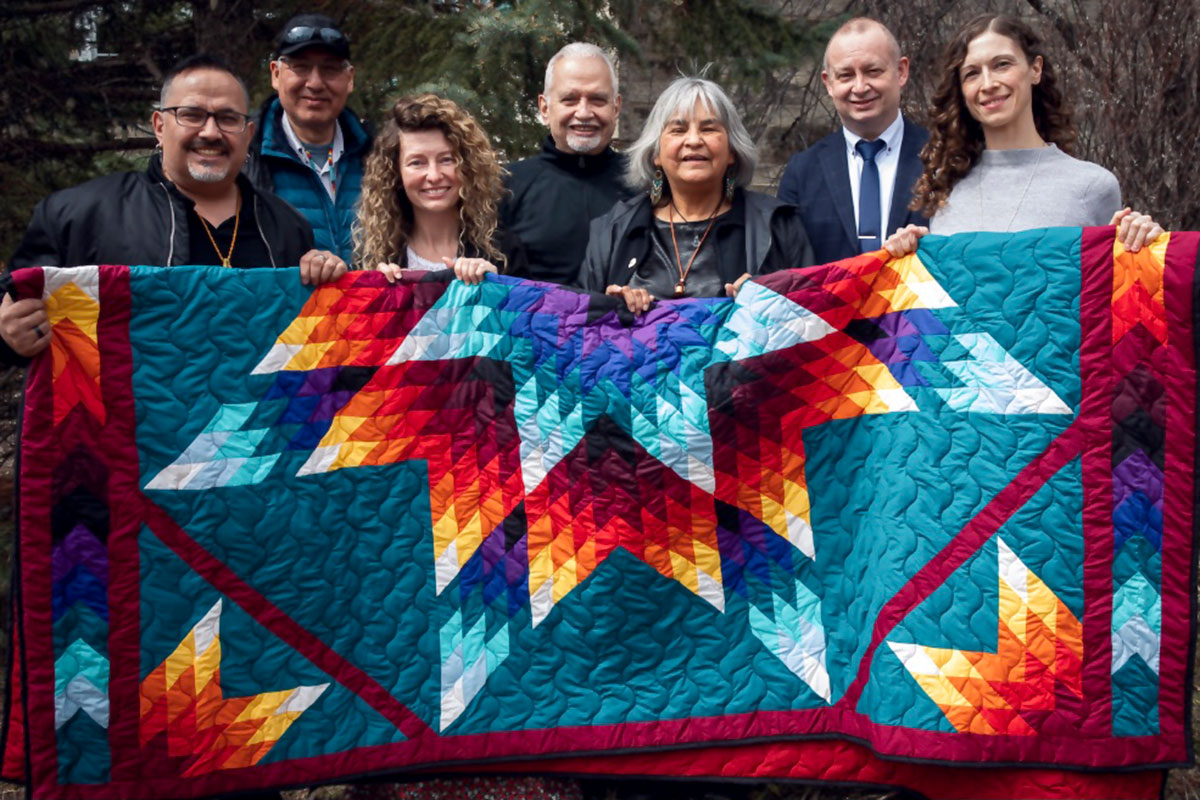
(l-r) Wayne Mason Jr., Mark Hall, Victoria Dearborn, Wayne Mason, Martina Fisher, Stephan Pflugmacher Lima and Emmelia Stainton with a star blanket after the traditional Indigenous naming and pipe ceremony.
Ceremony marks Reconciliation journey in the Clayton H. Riddell Faculty of Environment, Earth, and Resources
May 2 was a special day for the Clayton H. Riddell Faculty of Environment, Earth, and Resources.
The faculty hosted a traditional Indigenous naming and pipe ceremony to commemorate two new initiatives the Riddell Faculty is pursuing as part of its commitment to Reconciliation with Indigenous communities.
The ceremonies, a traditional naming and blessing of the Indigenous Focus Group on Reconciliation as well as the Environmental Education Curriculum initiative were led by Cree Knowledge Keeper Wayne Mason Sr. and Dakota Sioux Knowledge Keeper Mark Hall, Director and Board Member of Wa-Say Healing Centre. The ceremonies were capped off with a feast to celebrate the initiative.
The Indigenous Focus Group is a new initiative that will consist of Indigenous Leaders, Elders, Knowledge keepers, Indigenous community members, as well as staff and students of the Clayton H. Riddell Faculty of Environment, Earth, and Resources, says Victoria Dearborn, the Indigenous Project Coordinator in the faculty.
“Leading the response of the faculty regarding the Truth and Reconciliation calls to action, the Indigenous Focus Group will support the Riddell Faculty and UM’s alignment to lead systematic changes in Indigenous education,” says Dearborn.
During the ceremony, Knowledge Keeper Mark Hall named the Focus Group Helping the People – Oyate Wawokiya and the Curriculum initiative Circling Eagle – Waabdi Aokawinghe.
“He shared with us while naming the Curriculum Initiative that the Eagle is a protector, that there is a story of Eagle flying overhead, circling, watching and protecting the people from above,” says Dearborn. “That’s why the Initiative was named so; it is to protect the education for the children.”
The Indigenous Focus group is made up of members from different Indigenous Nations represented in Manitoba, and is a diverse group of age, gender, religious and cultural representation.
“As the Indigenous Focus group gets established and on task it will help to oversee the review, re-imagining and creation of a curriculum aligned with equity, Indigenous pedagogy, and Indigenous cultural teachings,” says Dearborn. “This relationship building between the university and Indigenous communities has the potential to lead to more successful collaborations and equally fulfilling projects in future.”
The faculty is also undertaking a curriculum initiative which will re-imagine curriculum with a goal of achieving a higher standard within education.
“Through meaningful engagement with communities and students, we can learn first-hand what challenges Indigenous students face when they leave their home environment to pursue post-secondary education,” says Dearborn.
The curriculum initiative will encourage educators to incorporate Indigenous speakers and presenters into their lectures, and will also help to provide a better understanding of the importance of Indigenous peoples in Canada, and their contributions to the country. “This collaboration will allow us to build our programming for accessibility in their home environment/community,” says Dearborn.
Stephan Pflugmacher Lima, the Dean of the Clayton H. Riddell Faculty of Environment, Earth, and Resources, notes that the ceremony was a meaningful way of marking the faculty’s commitment to Indigenous collaboration.
“With this newly set up Focus Group we would like to create a highly visible platform to have a long-lasting and sustainable relationship with Indigenous communities. Relationship building is paramount to our endeavours,” says Pflugmacher Lima. “We aim to connect and relationship build with Indigenous students to improve the accessibility to our faculty through either online or in-person degree courses. Relationship building through putting in the work before the work, attending ceremony and listening to teachings is a large component of that.”
“I was very moved and my heart was touched by the words spoken by the Elders,” Pflugmacher Lima continues. “Coming from Europe originally, I was unfamiliar with Indigenous Canadian History and Ceremony. I strive to learn more every day and listen to the stories and teachings of Indigenous peoples.”






